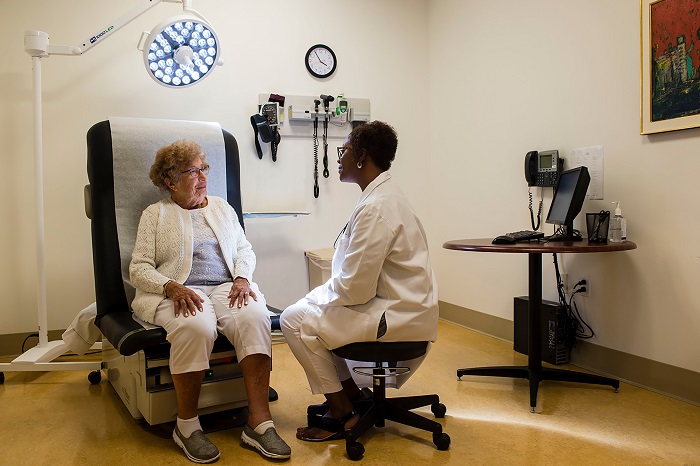As we age, our healthcare needs evolve, requiring specialized attention and care. Geriatric doctors, also known as geriatricians, are medical professionals with expertise in managing the complex health issues of older adults. Finding the right geriatric doctor near you is crucial for ensuring personalized care tailored to your unique needs. In this comprehensive guide, we’ll explore everything you need to know about locating geriatric doctors in your area and why their specialized care is essential for seniors.
Understanding Geriatric Care

Geriatric care focuses on addressing the medical, social, and psychological needs of older adults. Geriatricians are trained to manage multiple chronic conditions, medication management, cognitive impairments, mobility issues, and end-of-life care. Their comprehensive approach aims to improve quality of life, promote independence, and prevent disease complications among seniors.
Why Choose a Geriatric Doctor?
- Specialized Expertise: Geriatricians undergo additional training in geriatric medicine, equipping them with in-depth knowledge and skills specific to the aging population.
- Holistic Approach: Geriatric doctors consider the overall well-being of older adults, taking into account physical, emotional, and social factors that impact health.
- Coordination of Care: They collaborate with other healthcare providers, specialists, and caregivers to ensure integrated and personalized care plans.
- Preventive Care Focus: Geriatricians emphasize preventive measures to manage chronic conditions, reduce hospitalizations, and enhance overall health outcomes.
- Patient-Centered Care: They prioritize communication, respect, and shared decision-making, empowering seniors to actively participate in their healthcare journey.
Finding Geriatric Doctors Near You
- Utilize Online Directories: Explore online directories such as Healthgrades, Zocdoc, or your insurance provider’s website to search for geriatricians in your area. These platforms often provide detailed profiles, including credentials, patient reviews, and contact information.
- Consult with Primary Care Physician: Your primary care doctor can offer recommendations for geriatric specialists based on your specific needs and preferences. They may refer you to a geriatrician within their healthcare network.
- Reach Out to Local Hospitals or Clinics: Contact hospitals, medical centers, or community health clinics in your vicinity to inquire about geriatric services and available practitioners.
- Consider Referrals from Friends or Family: Seek recommendations from friends, family members, or support groups who have experience with geriatric care. Personal referrals can offer valuable insights and help you make informed decisions.
- Attend Health Fairs or Senior Events: Participate in local health fairs, senior expos, or educational seminars where you can connect with healthcare professionals specializing in geriatrics. These events often provide opportunities for networking and accessing resources.
Factors to Consider When Choosing a Geriatric Doctor

- Credentials and Experience: Verify the physician’s board certification in geriatric medicine and inquire about their experience working with older adults.
- Communication Style: Assess the doctor’s communication approach, listening skills, and ability to address your concerns with empathy and respect.
- Accessibility and Availability: Consider factors such as location, office hours, appointment availability, and accessibility for individuals with mobility issues.
- Comprehensive Services: Evaluate the range of services offered, including preventive care, chronic disease management, medication review, and geriatric assessments.
- Compatibility and Trust: Choose a geriatrician with whom you feel comfortable discussing your health issues openly and building a trusting relationship over time.
The Importance of Regular Geriatric Care
- Early Detection of Health Issues: Regular check-ups with a geriatric doctor facilitate early detection and management of age-related conditions such as hypertension, diabetes, osteoporosis, and dementia.
- Medication Management: Geriatricians review medications to minimize polypharmacy (multiple medications) and reduce the risk of adverse drug interactions or side effects.
- Functional Assessment: They assess physical function, mobility, balance, and cognitive abilities to identify potential areas of concern and implement appropriate interventions.
- Caregiver Support: Geriatricians offer guidance and resources to family caregivers, addressing their needs, concerns, and coping strategies for caregiving responsibilities.
- Palliative and End-of-Life Care: Geriatric specialists provide compassionate care and support for seniors facing serious illness, focusing on symptom management, comfort, and dignity at the end of life.
Choosing the right geriatric doctor is a crucial decision for seniors and their families. By following the steps outlined in this guide, you can locate experienced and compassionate geriatricians in your area who can provide personalized care tailored to your unique needs. Investing in regular geriatric care offers numerous benefits, including improved health outcomes, enhanced quality of life, and peace of mind for you and your loved ones as you navigate the aging process together. Take proactive steps today to prioritize your health and well-being in your golden years.


